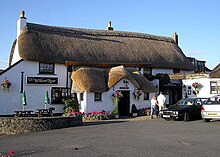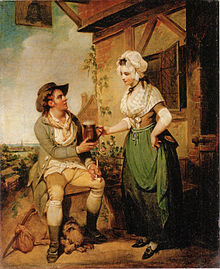
Back حانة Arabic Pab AZ Паб BE Паб BE-X-OLD Пъб Bulgarian শৌণ্ডিকালয় Bengali/Bangla Pub BS Pub Catalan Pub CO Hospoda Czech



A pub (short for public house) is a drinking establishment licensed to serve alcoholic drinks for consumption on the premises. The term first appeared in the late 17th century, to differentiate private houses from those open to the public as alehouses, taverns and inns.[1] Today, there is no strict definition, but CAMRA states a pub has four characteristics:
- is open to the public without membership or residency
- serves draught beer or cider without requiring food be consumed
- has at least one indoor area not laid out for meals
- allows drinks to be bought at a bar (i.e., not only table service)[2]
The history of pubs can be traced to taverns in Roman Britain,[3][4] and through Anglo-Saxon alehouses, but it was not until the early 19th century that pubs, as they are today, first began to appear. The model also became popular in countries and regions of British influence, where pubs are often still considered to be an important aspect of their culture.[5][6][7] In many places, especially in villages, pubs are the focal point of local communities. In his 17th-century diary, Samuel Pepys described the pub as "the heart of England".[8]
Although the drinks traditionally served include draught beer and cider, most also sell wine, spirits, tea, coffee, and soft drinks. Many pubs offer meals and snacks, and so-called gastro-pubs serve food in a manner akin to a restaurant.
A licence is required to operate a pub and the licensee is known as the landlord or landlady, or the publican. Often colloquially referred to as their "local" by regular customers,[9] pubs are typically chosen for their proximity to home or work, good food, social atmosphere, the presence of friends and acquaintances, and the availability of pub games such as darts or snooker. Pubs often screen sporting events, such as rugby, cricket and football. The pub quiz was established in the UK in the 1970s.
- ^ Cooper, Stephen. "Origins of the English pub" (PDF). chivalryandwar.co.uk.
- ^ Wickham, Melisa; Cominetti, Nye (2017). Closing time: London's public houses (PDF). Greater London Authority. ISBN 978-1-84781-654-2.
- ^ "History of the pub". Beer and Pub Association. Archived from the original on 13 July 2010.
- ^ Cite error: The named reference
Great British Pubwas invoked but never defined (see the help page). - ^ "Public House". Encyclopædia Britannica. 22 July 2021.
- ^ Cronin, Michael; O'Connor, Barbara (2003). Barbara O'Connor (ed.). Irish Tourism: image, culture, and identity. Tourism and Cultural Change. Vol. 1. Channel View Publications. p. 83. ISBN 978-1-873150-53-5. Retrieved 27 March 2011.
- ^ Australian Drinking Culture Archived 9 November 2020 at the Wayback Machine Convict Creations. Retrieved 24 April 2011.
- ^ "Editorial | In praise of ... pubs". The Guardian. 10 December 2016. Archived from the original on 21 December 2016.
- ^ Brown, Pete (18 August 2016). The Pub: A Cultural Institution. Jacqui Small LLP. p. 29. ISBN 9781911127017.